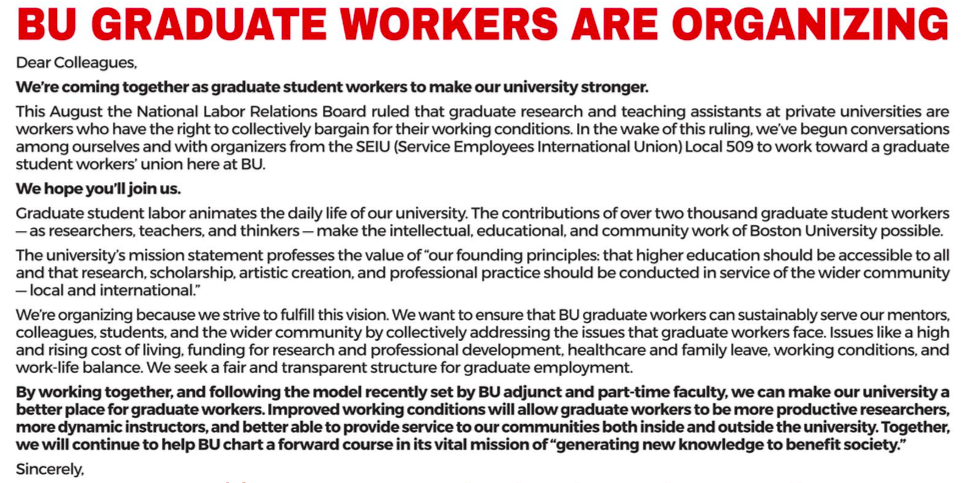Why we are unionizing at Boston University
Here ‘s some interesting, favorable news: associates at BU and I are releasing a project to unionize college student employees at Boston University with the Service Personnel International Union (SEIU)!
This August, the National Labor Relations Board licensed “trainee employees” (generally everybody from college students to mentor and research study assistants) the right to cumulative bargaining and unionization. Although the ramifications of unionization efforts by college students is yet unidentified, numerous college students are using up the cause at universities throughout the nation. Up until now, I think, just NYU has in fact “won” their union and have actually worked out an agreement with their university administration. However, there are at least 23 other universities that are likewise releasing projects to unionize their college student employees also consisting of Brandeis University, Brown University, Columbia University, Pennsylvania State University, Tufts University, University of Chicago, University of Virginia, and Yale University.
Here is our open letter about forming the union at BU:

I see this as an exceptionally crucial chance for a couple of factors. Initially, as I’m starting to find out direct, scholastic labor is precarious. There is beside no task security (unless you have the ability to land a desired tenure-track task) and the payment for college student staff members (who supply the huge bulk of mentor labor at a university like BU where tuition can top $50,000 each year) becomes less than base pay (about $22,000 each year). Since we as college student instructors and research study assistants do supply the scholastic labor foundation for a lot of universities, we need to have the ability to participate in cumulative settlements with our administration. We should have the ability to interact to require fairer payment, medical insurance, and other kinds of assistance to make this occupation and dedication to scholastic life more workable, specifically for those who do not have pre-existing monetary methods. Cumulative action is required to advance fairness and justice for scholastic workers throughout the U.S.
2nd, cumulative action and unions will be frantically required to fight the approaching tidal bore of Trumpism. Action such as the defend $15 among junk food employees and other efforts to advance employee rights are going to be under attack from what is specific to be a kleptocratic routine that will try to squash employees rights. College student unions have the prospective to be a beneficial source of ally power. We will have distinct sets of resources, relationships, gain access to, and so on to offer in working with individuals having a hard time for fundamental social and financial rights.
Lastly, as academics, much of us will operate in public law, federal government, believe tanks, non revenues, and so on. Having a generation of academics, thinkers, policy makers, and NGO leaders with deep experience in cumulative action, arranging, and unions possibly might bode well for the labor motion in the future. If more individuals have an individual experience with unions, see the worth of this kind of cumulative action, we might think of a resurgence for unions. However, this is likewise the huge threat: it’s sensible to believe that Trump will be hell bent to squashing cumulative labor. He’s had a long history of damaging his own staff members employees’ rights. In reality, unions are currently bracing for policy shifts.
So, now is the time to act. We have actually got to move rapidly at BU and I hope that other schools can make huge gains in arranging and unionizing in the coming months. The future of cumulative bargaining, and social justice for employees throughout markets and fields, might be at stake.
Source link
